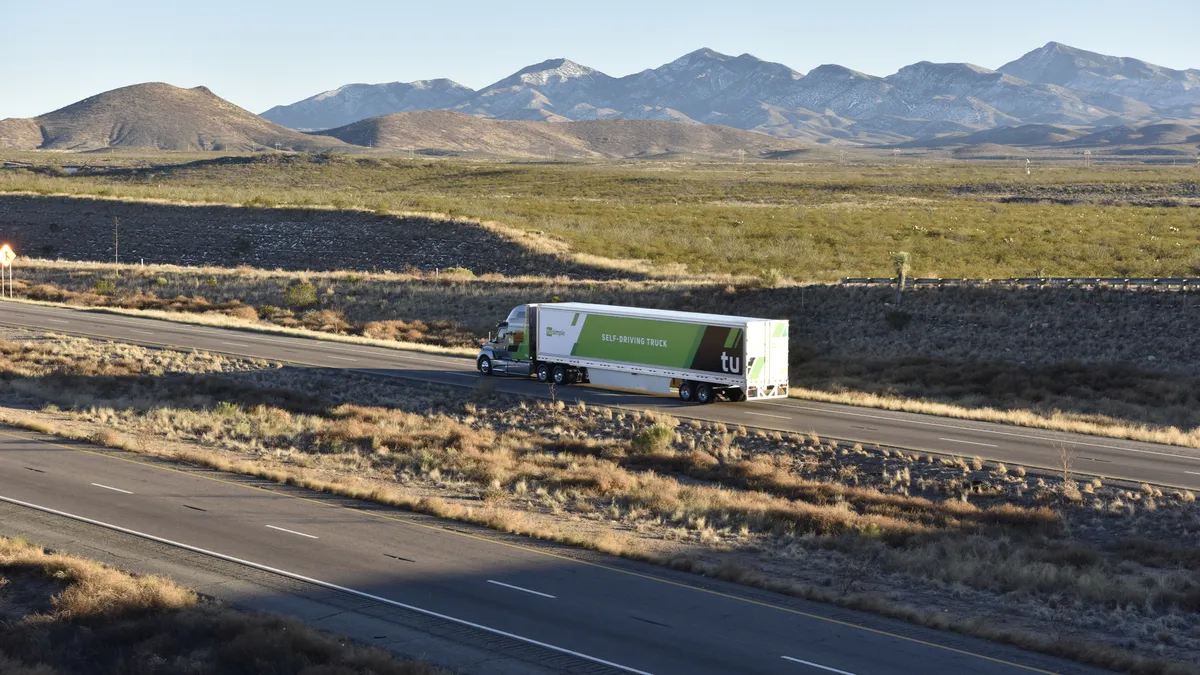Dive Brief:
- The FMCSA denied an application by Pronto.ai for an HOS exemption from the 11-hour driving limit and the prohibition against driving after the 14th hour after coming on duty, according to a decision released Monday.
- Pronto.ai asked that drivers operating commercial trucks equipped with Copilot by Pronto, an advanced drive assistance system, and operating under other safeguards, be allowed to drive up to 13 hours during a period of 15 consecutive hours, after coming on duty following 10 consecutive hours off duty.
- The FMCSA said it did analysis and reviewed public comments in response to the request. FMCSA said Pronto.ai did not show it could achieve "a level of safety that is equivalent to, or greater than, the level that would be achieved absent the exemption."
Dive Insight:
Artificial intelligence and assisted driving are part of trucking's future, but many trucking organizations did not agree with Pronto.ai's request for an exemption from HOS. Pronto.ai focuses on assisted driving, not autonomous driving.
The FMCSA asked for comments on the proposal on April 20. It got 294 comments opposing the waiver, and six supporting it. Alan Dunton, Pronto.ai spokesman, said the waiver was not granted because of those comments, "rather than a broader prism of overall operational and vehicle safety."
Pronto.ai originally asked for the exemption to encourage investment in and purchase of autonomous trucks and assist systems, according to FreightWaves, which first broke the request news on April 17.
Right now, a number of companies operate autonomous trucks and make deliveries using them. TuSimple operates 40 autonomous trucks in Arizona and Texas, with plans for California in 2022. Those trucks, however, have a "pilot" inside the cab, and those humans trigger the HOS rule. But the FMCSA's refusal to allow a waiver is a sign for companies promoting AI and autonomous vehicles that, for now, their trucks will not be exempt from HOS and other regulations.
Part of the issue is that the public, and even parts of the transport industry, may not be ready to completely trust AI systems in trucks, said Ashutosh Prasad, founder and CEO of KoiReader Technologies — perhaps, Prasad said, because people have not heard the full story about AI.
"People have been conditioned to believe AI is self-learning," said Prasad. In reality, AI is not as advanced as human learning, and Prasad said he frequently has to clarify what the technology does. Still, the tech could make driving safer, something that could be communicated better, Prasad said.
"It will reduce accidents," said Prasad. "That is the perspective that needs to be communicated with [the FMCSA]."
Critics of the waiver included the Teamsters, Advocates for Highway and Auto Safety, the California Highway Patrol, the Commercial Vehicle Safety Alliance, the Insurance Institute for Highway Safety and more. Waiver opponents questioned if AI and assisted-driver tech for automated vehicles is perfected. Among them was OOIDA.
"AVs are being touted as a solution by federal and state agencies that regulate the trucking industry to meet their goals of fewer crashes and zero fatalities," wrote Todd Spencer, president and CEO of OOIDA, in a May 20, letter to FMCSA. "However, there is virtually no data supporting these safety claims."
Spencer said the technology Pronto.ai touted, including advanced driving systems, automatic emergency brakes, adaptive cruise control, driver-facing cameras and lane-departure warning systems, do not always work well.
"In reality, these technologies come with their own dangers and we would argue that they can actually increase the risk of a crash in many cases," Spencer wrote.
Opposition also came from the Truckload Carriers Association, which argued that the current 11-hour window was underutilized and, thus, was adequate.
Six commenters supported the exemption request, FMCSA reported, including Scopelitis Transportation Consulting.












